Name the technique and the property of plant cells that can help to grow somaclones of certain desired varitey of apple. Explain how somaclones of apple can be obtained in the lab so as to get the desired variety on a large scale.
Tissue culture or micropropagation is used which utilizes totipotency to grow somaclones of certain desired varieties of apples in short period of time.
A specific tissue of desired varieties is chosen and grown invitro under sterile conditions to give callus. Callus is cut into small parts taken in different test tubes added with specific phyto-hormones. Roots and shoots grows after few days. Plants after few weeks of hardening process get ready to be planted in field.
Topper's Solved these Questions
- XII BOARDSBOOK - XII BOARDS PREVIOUS YEARCHAPTER - XII BOARDSEXERCISE - Section D
18 Videos
- XII BOARDSBOOK - XII BOARDS PREVIOUS YEARCHAPTER - XII BOARDSEXERCISE - SET -I Section -A
8 Videos
- XII BOARDSBOOK - XII BOARDS PREVIOUS YEARCHAPTER - XII BOARDSEXERCISE - Section B
50 Videos
- SAMPLE PAPER 2019BOOK - XII BOARDS PREVIOUS YEARCHAPTER - SAMPLE PAPER 2019EXERCISE - Section E Part B
3 Videos
Similar Questions
Knowledge Check
How Do You Like Those Apples? Marketed as SmartFresh, the chemical 1-MCP (1-methylcyclopropene) has been used by fruit growers since 2002 in the United States and elsewhere to preserve the crispness and lengthen the storage life of apples and other fruit, which often must travel long distances before being eaten by consumers. 23 1-MCP lengthens storage life by three to four times when applied to apples. This extended life allows producers to sell their apples in the off-season, months after the apples have been harvested. And at a cost of about one cent per pound of apples, 1-MCP is a highly cost-effective treatment. However, 1-MCP is not a panacea for fruit producers or sellers: there are problems and limitations associated with its use.[1] 1-MCP works by limiting a fruit’s production of ethylene, 24 it is a chemical that causes fruit to ripen and eventually rot. [2] While 1-MCP keeps apples 25 tight and crisp for months, it also limits 26 their scent production. [3] This may not be much of a problem with certain kinds of apples that are not naturally very fragrant, such as Granny Smith, but for apples that are prized for their fruity fragrance, such as McIntosh, this can be a problem with onsumers, 27 that will reject apples lacking the expected aroma. [4] But some fruits do not respond as well to 1-MCP as others 28 did, and some even respond adversely. [5] Furthermore, some fruits, particularly those that naturally produce a large amount of ethylene, do not respond as well to 1-MCP treatment. [6] Take Bartlett 29 pears, for instance, unless they are treated with exactly the right amount of 1-MCP at exactly the right time, they will remain hard and green until they rot, and consumers who experience this will be unlikely to purchase them again. 30 Finally, researchers have found that 1-MCP actually increases susceptibility to some pathologies in certain apple varieties. For example, Empire apples are prone to a condition that causes the flesh of the apple to turn brown. Traditionally, apple producers have dealt with this problem by leaving the apples in the open air for three weeks before storing them in a controlled atmosphere with tightly regulated temperature, humidity, and carbon dioxide levels. As the graph shows, the flesh of untreated Empire apples that are first stored in the open air undergoes 31 roughly five percent less browning than the flesh of untreated Empire apples that are immediately put into storage in a controlled environment. However, when Empire apples are treated with 1-MCP, 32 their flesh turns brown when the apples are first stored in the open air, though not under other conditions. Although researchers continue to search for the right combination of factors that will keep fruits fresh and attractive, 33 the problem may be that consumers are overly concerned with superficial qualities rather than the actual freshness of the fruit.
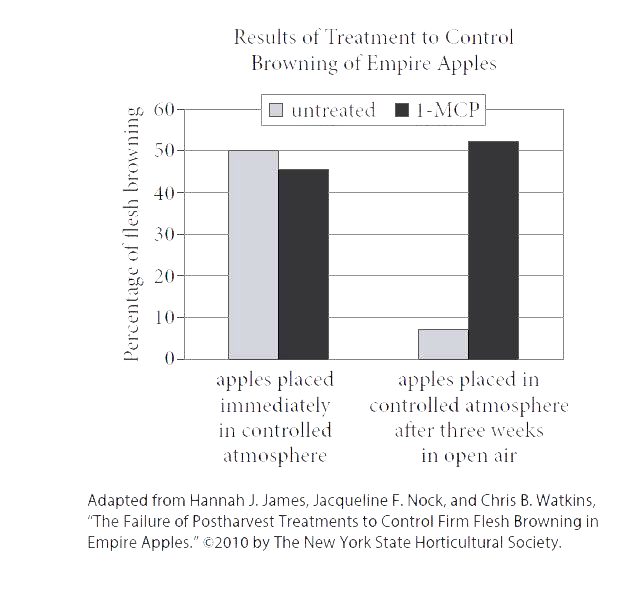
Which choice most effectively combines the underlined sentences?AWhen applied to apples, 1-MCP lengthens storage life by three to four times, allowing producers to sell their apples in the off-season, months after the apples have been harvested.BProducers are allowed to sell their apples months after they have been harvested—in the off-season—because 1-MCP, when applied to apples, lengthens their storage life by three to four timesC1-MCP lengthens storage life, when applied to apples, by three to four times, allowing producers to sell their apples months after the apples have been harvested in the off-season.DMonths after apples have been harvested, producers are allowed to sell their apples, in the off-season, because 1-MCP lengthens storage life when applied to apples by three to four times.How Do You Like Those Apples? Marketed as SmartFresh, the chemical 1-MCP (1-methylcyclopropene) has been used by fruit growers since 2002 in the United States and elsewhere to preserve the crispness and lengthen the storage life of apples and other fruit, which often must travel long distances before being eaten by consumers. 23 1-MCP lengthens storage life by three to four times when applied to apples. This extended life allows producers to sell their apples in the off-season, months after the apples have been harvested. And at a cost of about one cent per pound of apples, 1-MCP is a highly cost-effective treatment. However, 1-MCP is not a panacea for fruit producers or sellers: there are problems and limitations associated with its use.[1] 1-MCP works by limiting a fruit’s production of ethylene, 24 it is a chemical that causes fruit to ripen and eventually rot. [2] While 1-MCP keeps apples 25 tight and crisp for months, it also limits 26 their scent production. [3] This may not be much of a problem with certain kinds of apples that are not naturally very fragrant, such as Granny Smith, but for apples that are prized for their fruity fragrance, such as McIntosh, this can be a problem with consumers, 27 that will reject apples lacking the expected aroma. [4] But some fruits do not respond as well to 1-MCP as others 28 did, and some even respond adversely. [5] Furthermore, some fruits, particularly those that naturally produce a large amount of ethylene, do not respond as well to 1-MCP treatment. [6] Take Bartlett 29 pears, for instance, unless they are treated with exactly the right amount of 1-MCP at exactly the right time, they will remain hard and green until they rot, and consumers who experience this will be unlikely to purchase them again. 30 Finally, researchers have found that 1-MCP actually increases susceptibility to some pathologies in certain apple varieties. For example, Empire apples are prone to a condition that causes the flesh of the apple to turn brown. Traditionally, apple producers have dealt with this problem by leaving the apples in the open air for three weeks before storing them in a controlled atmosphere with tightly regulated temperature, humidity, and carbon dioxide levels. As the graph shows, the flesh of untreated Empire apples that are first stored in the open air undergoes 31 roughly five percent less browning than the flesh of untreated Empire apples that are immediately put into storage in a controlled environment. However, when Empire apples are treated with 1-MCP, 32 their flesh turns brown when the apples are first stored in the open air, though not under other conditions. Although researchers continue to search for the right combination of factors that will keep fruits fresh and attractive, 33 the problem may be that consumers are overly concerned with superficial qualities rather than the actual freshness of the fruit.
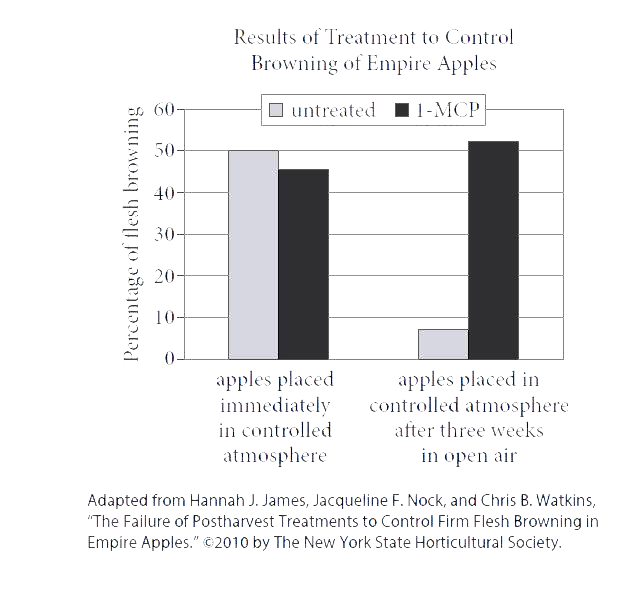 ANO CHANGEBfirmCstiffDtaut
ANO CHANGEBfirmCstiffDtautHow Do You Like Those Apples? Marketed as SmartFresh, the chemical 1-MCP (1-methylcyclopropene) has been used by fruit growers since 2002 in the United States and elsewhere to preserve the crispness and lengthen the storage life of apples and other fruit, which often must travel long distances before being eaten by consumers. 23 1-MCP lengthens storage life by three to four times when applied to apples. This extended life allows producers to sell their apples in the off-season, months after the apples have been harvested. And at a cost of about one cent per pound of apples, 1-MCP is a highly cost-effective treatment. However, 1-MCP is not a panacea for fruit producers or sellers: there are problems and limitations associated with its use.[1] 1-MCP works by limiting a fruit’s production of ethylene, 24 it is a chemical that causes fruit to ripen and eventually rot. [2] While 1-MCP keeps apples 25 tight and crisp for months, it also limits 26 their scent production. [3] This may not be much of a problem with certain kinds of apples that are not naturally very fragrant, such as Granny Smith, but for apples that are prized for their fruity fragrance, such as McIntosh, this can be a problem with consumers, 27 that will reject apples lacking the expected aroma. [4] But some fruits do not respond as well to 1-MCP as others 28 did, and some even respond adversely. [5] Furthermore, some fruits, particularly those that naturally produce a large amount of ethylene, do not respond as well to 1-MCP treatment. [6] Take Bartlett 29 pears, for instance, unless they are treated with exactly the right amount of 1-MCP at exactly the right time, they will remain hard and green until they rot, and consumers who experience this will be unlikely to purchase them again. 30 Finally, researchers have found that 1-MCP actually increases susceptibility to some pathologies in certain apple varieties. For example, Empire apples are prone to a condition that causes the flesh of the apple to turn brown. Traditionally, apple producers have dealt with this problem by leaving the apples in the open air for three weeks before storing them in a controlled atmosphere with tightly regulated temperature, humidity, and carbon dioxide levels. As the graph shows, the flesh of untreated Empire apples that are first stored in the open air undergoes 31 roughly five percent less browning than the flesh of untreated Empire apples that are immediately put into storage in a controlled environment. However, when Empire apples are treated with 1-MCP, 32 their flesh turns brown when the apples are first stored in the open air, though not under other conditions. Although researchers continue to search for the right combination of factors that will keep fruits fresh and attractive, 33 the problem may be that consumers are overly concerned with superficial qualities rather than the actual freshness of the fruit.
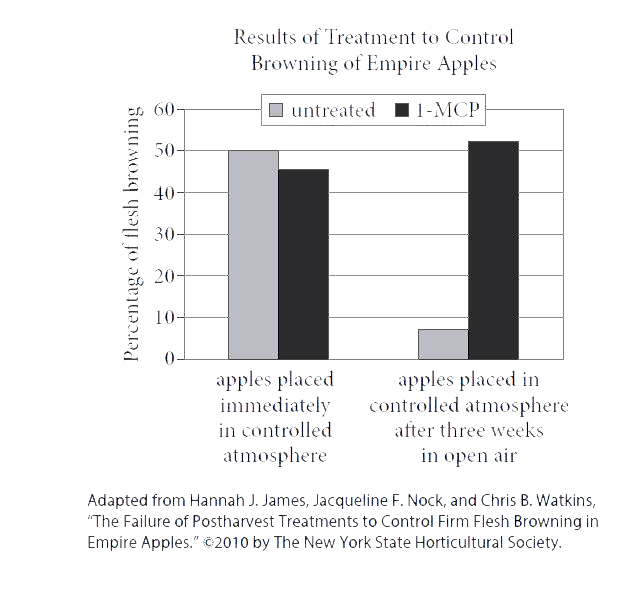
Which choice offers an accurate interpretation of the data in the graph?ANO CHANGEBslightly more browning thanCtwice as much browning asDsubstantially less browning than
You can make a cell by using an apple, a strip of copper, and a strip of silver. Explain how you would construct the-cell. What type of cell did you make? Explain your amwer.
View SolutionHow Do You Like Those Apples? Marketed as SmartFresh, the chemical 1-MCP (1-methylcyclopropene) has been used by fruit growers since 2002 in the United States and elsewhere to preserve the crispness and lengthen the storage life of apples and other fruit, which often must travel long distances before being eaten by consumers. 23 1-MCP lengthens storage life by three to four times when applied to apples. This extended life allows producers to sell their apples in the off-season, months after the apples have been harvested. And at a cost of about one cent per pound of apples, 1-MCP is a highly cost-effective treatment. However, 1-MCP is not a panacea for fruit producers or sellers: there are problems and limitations associated with its use.[1] 1-MCP works by limiting a fruit’s production of ethylene, 24 it is a chemical that causes fruit to ripen and eventually rot. [2] While 1-MCP keeps apples 25 tight and crisp for months, it also limits 26 their scent production. [3] This may not be much of a problem with certain kinds of apples that are not naturally very fragrant, such as Granny Smith, but for apples that are prized for their fruity fragrance, such as McIntosh, this can be a problem with consumers, 27 that will reject apples lacking the expected aroma. [4] But some fruits do not respond as well to 1-MCP as others 28 did, and some even respond adversely. [5] Furthermore, some fruits, particularly those that naturally produce a large amount of ethylene, do not respond as well to 1-MCP treatment. [6] Take Bartlett 29 pears, for instance, unless they are treated with exactly the right amount of 1-MCP at exactly the right time, they will remain hard and green until they rot, and consumers who experience this will be unlikely to purchase them again. 30 Finally, researchers have found that 1-MCP actually increases susceptibility to some pathologies in certain apple varieties. For example, Empire apples are prone to a condition that causes the flesh of the apple to turn brown. Traditionally, apple producers have dealt with this problem by leaving the apples in the open air for three weeks before storing them in a controlled atmosphere with tightly regulated temperature, humidity, and carbon dioxide levels. As the graph shows, the flesh of untreated Empire apples that are first stored in the open air undergoes 31 roughly five percent less browning than the flesh of untreated Empire apples that are immediately put into storage in a controlled environment. However, when Empire apples are treated with 1-MCP, 32 their flesh turns brown when the apples are first stored in the open air, though not under other conditions. Although researchers continue to search for the right combination of factors that will keep fruits fresh and attractive, 33 the problem may be that consumers are overly concerned with superficial qualities rather than the actual freshness of the fruit.
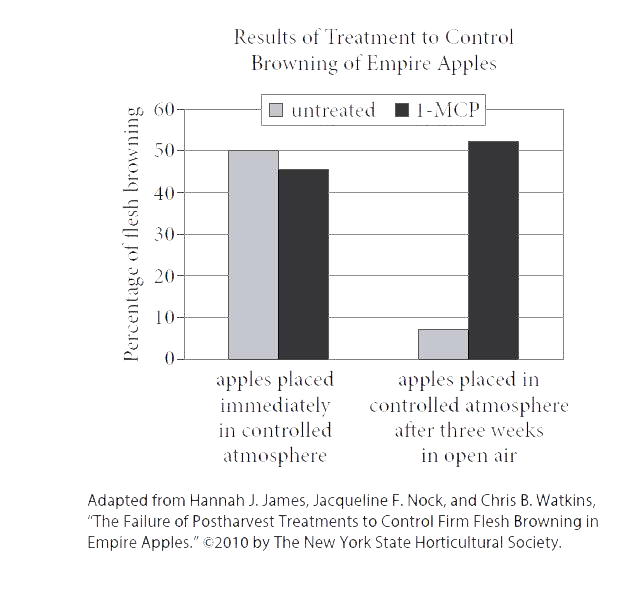
To make this paragraph most logical sentcence 4 should be placed
View SolutionHow Do You Like Those Apples? Marketed as SmartFresh, the chemical 1-MCP (1-methylcyclopropene) has been used by fruit growers since 2002 in the United States and elsewhere to preserve the crispness and lengthen the storage life of apples and other fruit, which often must travel long distances before being eaten by consumers. 23 1-MCP lengthens storage life by three to four times when applied to apples. This extended life allows producers to sell their apples in the off-season, months after the apples have been harvested. And at a cost of about one cent per pound of apples, 1-MCP is a highly cost-effective treatment. However, 1-MCP is not a panacea for fruit producers or sellers: there are problems and limitations associated with its use.[1] 1-MCP works by limiting a fruit’s production of ethylene, 24 it is a chemical that causes fruit to ripen and eventually rot. [2] While 1-MCP keeps apples 25 tight and crisp for months, it also limits 26 their scent production. [3] This may not be much of a problem with certain kinds of apples that are not naturally very fragrant, such as Granny Smith, but for apples that are prized for their fruity fragrance, such as McIntosh, this can be a problem with consumers, 27 that will reject apples lacking the expected aroma. [4] But some fruits do not respond as well to 1-MCP as others 28 did, and some even respond adversely. [5] Furthermore, some fruits, particularly those that naturally produce a large amount of ethylene, do not respond as well to 1-MCP treatment. [6] Take Bartlett 29 pears, for instance, unless they are treated with exactly the right amount of 1-MCP at exactly the right time, they will remain hard and green until they rot, and consumers who experience this will be unlikely to purchase them again. 30 Finally, researchers have found that 1-MCP actually increases susceptibility to some pathologies in certain apple varieties. For example, Empire apples are prone to a condition that causes the flesh of the apple to turn brown. Traditionally, apple producers have dealt with this problem by leaving the apples in the open air for three weeks before storing them in a controlled atmosphere with tightly regulated temperature, humidity, and carbon dioxide levels. As the graph shows, the flesh of untreated Empire apples that are first stored in the open air undergoes 31 roughly five percent less browning than the flesh of untreated Empire apples that are immediately put into storage in a controlled environment. However, when Empire apples are treated with 1-MCP, 32 their flesh turns brown when the apples are first stored in the open air, though not under other conditions. Although researchers continue to search for the right combination of factors that will keep fruits fresh and attractive, 33 the problem may be that consumers are overly concerned with superficial qualities rather than the actual freshness of the fruit.
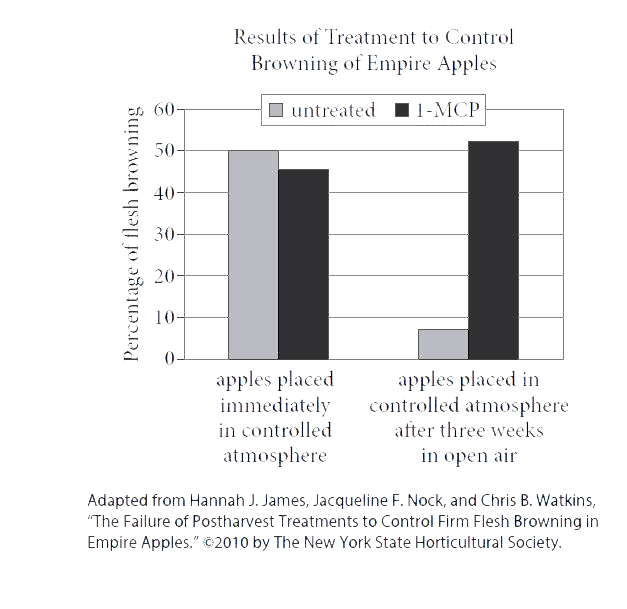
Which choice offers an accurate interpretation of the data in the graph?
View SolutionHow Do You Like Those Apples? Marketed as SmartFresh, the chemical 1-MCP (1-methylcyclopropene) has been used by fruit growers since 2002 in the United States and elsewhere to preserve the crispness and lengthen the storage life of apples and other fruit, which often must travel long distances before being eaten by consumers. 23 1-MCP lengthens storage life by three to four times when applied to apples. This extended life allows producers to sell their apples in the off-season, months after the apples have been harvested. And at a cost of about one cent per pound of apples, 1-MCP is a highly cost-effective treatment. However, 1-MCP is not a panacea for fruit producers or sellers: there are problems and limitations associated with its use.[1] 1-MCP works by limiting a fruit’s production of ethylene, 24 it is a chemical that causes fruit to ripen and eventually rot. [2] While 1-MCP keeps apples 25 tight and crisp for months, it also limits 26 their scent production. [3] This may not be much of a problem with certain kinds of apples that are not naturally very fragrant, such as Granny Smith, but for apples that are prized for their fruity fragrance, such as McIntosh, this can be a problem with consumers, 27 that will reject apples lacking the expected aroma. [4] But some fruits do not respond as well to 1-MCP as others 28 did, and some even respond adversely. [5] Furthermore, some fruits, particularly those that naturally produce a large amount of ethylene, do not respond as well to 1-MCP treatment. [6] Take Bartlett 29 pears, for instance, unless they are treated with exactly the right amount of 1-MCP at exactly the right time, they will remain hard and green until they rot, and consumers who experience this will be unlikely to purchase them again. 30 Finally, researchers have found that 1-MCP actually increases susceptibility to some pathologies in certain apple varieties. For example, Empire apples are prone to a condition that causes the flesh of the apple to turn brown. Traditionally, apple producers have dealt with this problem by leaving the apples in the open air for three weeks before storing them in a controlled atmosphere with tightly regulated temperature, humidity, and carbon dioxide levels. As the graph shows, the flesh of untreated Empire apples that are first stored in the open air undergoes 31 roughly five percent less browning than the flesh of untreated Empire apples that are immediately put into storage in a controlled environment. However, when Empire apples are treated with 1-MCP, 32 their flesh turns brown when the apples are first stored in the open air, though not under other conditions. Although researchers continue to search for the right combination of factors that will keep fruits fresh and attractive, 33 the problem may be that consumers are overly concerned with superficial qualities rather than the actual freshness of the fruit.
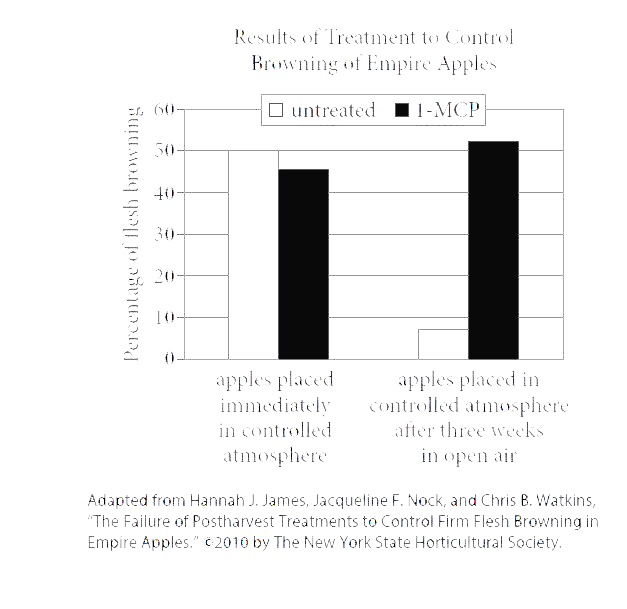
View SolutionHow Do You Like Those Apples? Marketed as SmartFresh, the chemical 1-MCP (1-methylcyclopropene) has been used by fruit growers since 2002 in the United States and elsewhere to preserve the crispness and lengthen the storage life of apples and other fruit, which often must travel long distances before being eaten by consumers. 23 1-MCP lengthens storage life by three to four times when applied to apples. This extended life allows producers to sell their apples in the off-season, months after the apples have been harvested. And at a cost of about one cent per pound of apples, 1-MCP is a highly cost-effective treatment. However, 1-MCP is not a panacea for fruit producers or sellers: there are problems and limitations associated with its use.[1] 1-MCP works by limiting a fruit’s production of ethylene, 24 it is a chemical that causes fruit to ripen and eventually rot. [2] While 1-MCP keeps apples 25 tight and crisp for months, it also limits 26 their scent production. [3] This may not be much of a problem with certain kinds of apples that are not naturally very fragrant, such as Granny Smith, but for apples that are prized for their fruity fragrance, such as McIntosh, this can be a problem with consumers, 27 that will reject apples lacking the expected aroma. [4] But some fruits do not respond as well to 1-MCP as others 28 did, and some even respond adversely. [5] Furthermore, some fruits, particularly those that naturally produce a large amount of ethylene, do not respond as well to 1-MCP treatment. [6] Take Bartlett 29 pears, for instance, unless they are treated with exactly the right amount of 1-MCP at exactly the right time, they will remain hard and green until they rot, and consumers who experience this will be unlikely to purchase them again. 30 Finally, researchers have found that 1-MCP actually increases susceptibility to some pathologies in certain apple varieties. For example, Empire apples are prone to a condition that causes the flesh of the apple to turn brown. Traditionally, apple producers have dealt with this problem by leaving the apples in the open air for three weeks before storing them in a controlled atmosphere with tightly regulated temperature, humidity, and carbon dioxide levels. As the graph shows, the flesh of untreated Empire apples that are first stored in the open air undergoes 31 roughly five percent less browning than the flesh of untreated Empire apples that are immediately put into storage in a controlled environment. However, when Empire apples are treated with 1-MCP, 32 their flesh turns brown when the apples are first stored in the open air, though not under other conditions. Although researchers continue to search for the right combination of factors that will keep fruits fresh and attractive, 33 the problem may be that consumers are overly concerned with superficial qualities rather than the actual freshness of the fruit.
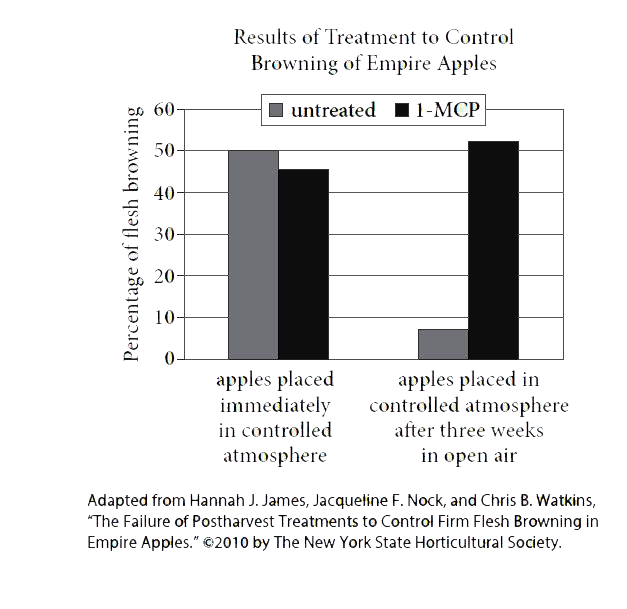
View Solution
